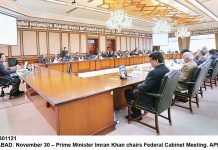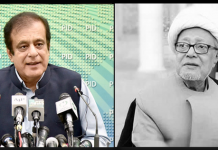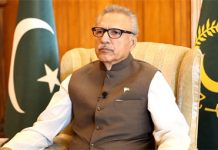ISLAMABAD: Pakistan’s High Commissioner to India Abdul Basit has called for “serious and sustained diplomacy”, “result-oriented engagement” with India to pave the way to establish durable peace and prosperity that would help eliminate poverty from the two countries.
In an interview with India’s daily Indian Express, High Commissioner Abdul Basit said Pakistan does not see dialogue as a favour by one country to another. “Dialogue is in our mutual interest. If India is ready, Pakistan will be willing. If India is not ready, then we can always wait for India to make up its mind”, he said.
The High Commissioner said both the countries need to work for peace and prosperity, and recalled the Indian PM saying in his address in Kerala that we need to fight against poverty. “If we were to fight against poverty, I think we need to work together.”
The High Commissioner also spoke at length about the ‘surgical strike’, the derailed dialogue process, the postponement of SAARC Summit and future of Pakistan India relations.
When asked why Pakistan was denying the surgical strikes, Abdul Basit said, “Jammu and Kashmir continues to be the core dispute between the two countries and we strongly believed that these can only be resolved through serious and sustained diplomacy from UN resolutions to our joint statement, which our two countries have issued in Islamabad on December 10 last year.
Jammu and Kashmir remains the core issue, and both countries recognise that this dispute needs to be resolved, and I think you may also appreciate that both our countries have fought three wars because of this dispute, in 1948, 1965, 1971 and the Kargil conflict, and all these wars, conflicts preceded the Samjhauta Express blast, the Mumbai attack, and so on and so forth. So, from our viewpoint, both countries must bring diplomacy to the centre stage.
Now, coming to your question, I think three things have happened. You ask me as to why Pakistan is denying the strikes. Firstly, this is for the first time that India has publicly acknowledged to have breached the 2003 ceasefire understanding, so this is quite significant.
Secondly, what I see is the commonly acceptable definition of surgical strike has been modulated unilaterally by India, which also means cross-LoC firing. Why I am saying this? The official statement issued by India, your (Indian) DGMO, very clearly suggests that the action took place along the Line of Control, not across.
Now, as far as Pakistan is concerned, we haven’t seen any activity on September 29, other than usual cross-LoC firing and you know what our stance is, we have also taken both Pakistani and foreign journalists to the locations. There is no sign of any activity in those areas, other than the cross-LoC firing in which two Pakistani soldiers have been martyred.
I can assure you that, God forbid, if any action takes place, it will be retaliated immediately. We are confident that our deterrence is working. It is important to avoid drawing wrong conclusions and raising false expectations, because it is not in our mutual interest to push ourselves to the precipice.
As for the attacks in Uri and Baramulla, it is for the Indian government to explain this, not for me to jump the gun. But what bothers us is whenever attacks occur in India, immediately fingers are pointed at Pakistan. We saw that post-Uri, followed during the attack and we are seeing in Baramulla, so my sincere advice to Indian friends and people that this is very, very unhelpful. You know the problems in J&K, you know what is happening since July 8.
I am not linking the attacks to the protests in Kashmir. It is for your government to determine, for you to find out what your investigations tell you. And since you haven’t shared your findings with us, as to what happened, indeed happened there, so it is not for me to comment on the Uri attack.
If hundreds and thousands of people come out on the streets to attend Burhan Wani’s funeral, it is important not to deny this. What is happening clearly shows as to what exactly people of J&K are thinking, and what they want. So as I said earlier, both our countries need to give diplomacy centre-stage and rather than talking at each other, it is important to talk to each other and that appears the best possible way forward.
We need to have serious and sustained diplomacy, and result-oriented engagement.
At the end of the day, I would say both our countries need to work for peace and prosperity, as the Indian PM very rightly said in his address in Kerala, we need to fight against poverty. If we were to fight against poverty, I think we need to work together.
When asked how he justified statements by your Khawaja Asif threatening the use of nuclear weapons, he said, “Such statements we have seen here in India also. Both our countries understand war is not really a solution to our problems and there is simply no room for a conflict in a nuclear environment. It is important to avoid raising false expectations, as happened after the cross-LoC firing [which India calls a surgical strike] on September 29. We cannot afford to go down that route. Statements are made, but I think both countries do understand serious implications of escalating the situation either horizontally or vertically.










